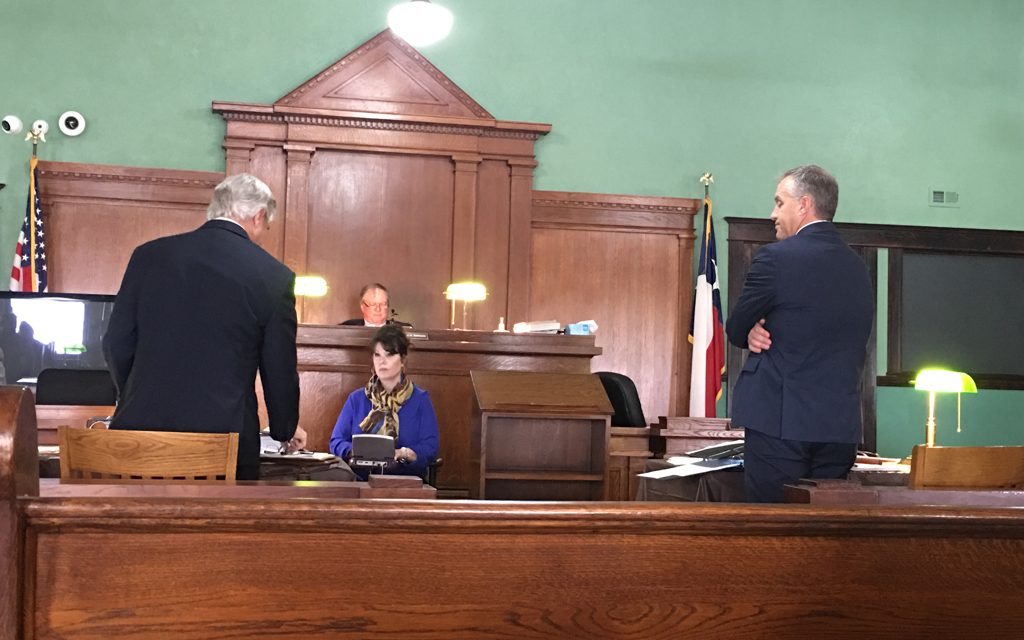Neighboring cities met again in the 87th District Court of Judge Patrick Simmons Wednesday, February 27, 2019 in what promised to be the final hearing before the court’s jurisdiction is determined.
Attorneys Andy Messer, Teague, and Eric Storm, Fairfield, delivered their arguments in the third hearing since the lawsuit was filed by Teague in September of 2018 alleging breaches in the Interlocal Definitive Agreement and Facilities Agreement between the two cities and seeking declaratory and injunctive relief.
Since the lawsuit began, Fairfield’s attorneys have sought to establish that the city is protected from civil litigation under sovereign immunity, which they maintain is not waived in the case of these Agreements between the two municipalities, for the sole benefit of the Texas Department of Criminal Justice.
In response to the suit filed against them, Fairfield filed a plea to the jurisdiction and a motion to dismiss.
Teague however, seeks to prove that Fairfield operates the facilities in a proprietary function and are therefore not protected by sovereign immunity.
These interlocal agreements were established in 1990 and 1992, respectively, as the cities partnered with the Texas Department of Criminal Justice (TDCJ) to provide water and wastewater facilities for the construction of the Boyd Unit prison located on Highway 84 between Fairfield and Teague.
At the time, the cities worked together to secure land and a bond to install the self-contained system that services the prison.
However, the cooperation may have ended at the facilities’ construction, as both cities have failed to maintain communication, and as alleged by Teague, mismanagement of funds and records by Fairfield.
When the Agreement was signed in 1990, Fairfield was tasked with managing the operation and maintenance of the water and sewer plants, as well as preparing an operating plan and budget for the review and approval of both City Councils.
Investigation into the Agreement and its execution began in April of 2018 when the City of Teague was contacted by their then city attorney, who at the time was also acting as Fairfield’s city attorney, with a request to address Teague’s Council regarding their official release from the Agreement, set to be completed in 2020, as well as the new proposed bond being pursued by the City of Fairfield and TDCJ.
The request prompted Teague to begin research into the Agreement that the two cities had been a part of for twenty-eight years, with Teague collecting continuous monthly bond payments from Fairfield in the amount of $10,234.08, as the Agreement stipulates. It also details that all revenues collected by Fairfield from water and wastewater sales will be used exclusively for debt retirement and facility operation and maintenance expenses.
The suit alleges that Fairfield, the operator of the facilities, failed to pay Teague its percentage of associated revenues and never established a special revenue account as outlined in the Agreement. Teague also alleges that Fairfield committed numerous violations of the Texas Open Meetings Act.
Each attorney came prepared with thick binders full of applicable case law and statutes for Judge Simmons to study while he works to establish the court’s jurisdiction in this case.
Eric Storm, representing Fairfield, opened the arguments, informing the judge that the evening before the hearing, while en route to Fairfield from Austin, he received a 50-page response to Fairfield’s plea to the jurisdiction, filed on October 15, 2018 and amended February 5, 2019, from Teague’s attorney Andy Messer.
“We’ve had two continuances. The plaintiff has had more than ample time to provide his response, but chose to do so after the close of business yesterday.” Storm told the judge.
Storm says he received another email later that evening informing him of an amended petition filed by Teague. He told Judge Simmons that ultimately, he received more than 1,600 pages of exhibits for the hearing, set for the next morning. Storm said that he was obviously unable to review the mass of information in time, and therefore would be unable to address those exhibits at this hearing.
“These are the kind of tactics that do a disservice to the court – to our clients, because I cannot be prepared to address those things. It’s just physically impossible.”
Furthermore, Storm said when he arrived for the hearing that morning, Teague attorneys supplied him with a thumb drive containing video, which he was also unable to view prior to appearing before the judge.
Storm told the judge that he considered filing for a continuance on behalf of his client, even going as far as to draft one. However, with two continuances already granted to Teague since they filed suit in September of 2018, he chose to proceed without addressing the plaintiff’s new exhibits and amended petition. Storm did ask the judge that he be allowed a week to review and issue his response to these new documents.
“I intend to take all this under advisement and look through it all,” replied Judge Simmons. “I’m sure I will probably ask both of you to respond to what the each other have said here today.
“I don’t intend to make a ruling this morning. I’ve done some of my own research and I kind of feel like I know what the issues are and I assure you I’m not intending to go through all of this today,” said Judge Simmons.
Summarizing Fairfield’s answer to Teague’s allegations, Storm stated that this has always been a legal argument, not factual. A question of whether or not the City of Fairfield maintains sovereign immunity.
He stated that, as such, establishing this court’s jurisdiction does not require the massive amount of evidence that the plaintiff has been gathering and reviewing since discovery began in April of 2018.
Storm addressed Teague’s claims that Fairfield has withheld profits from Teague, reading from the Agreement’s section regarding the distribution of revenues from water and wastewater sales. He claims that profiting from the venture is impossible, explaining that under the Agreement, Fairfield is responsible for distributing the revenues collected exclusively for debt management, in the form of bond payments, and for the facilities’ operation and maintenance.
Under the Agreement, any remaining funds are to be disbursed 55% to Fairfield’s TDCJ Bond Account and 45% to Teague’s TDCJ Bond Account until the debt incurred by either city for the project is satisfied, which is still on schedule for December 2020.
“There’s no opportunity for them [the cities] to pay off their debt and then start profiting. There is no benefit to the City of Fairfield or Teague,” stated Storm, explaining that since the TDCJ facilities do not service citizens of either city, the only benefit is to the operation of the prison and the employment opportunities it provides to the area.
Storm concluded his argument by reiterating that the Texas Supreme Court considers three main factors when deciding cases such as this – whether the contract expressly waives sovereign immunity and whether the parties involved benefit directly from the agreement or pay for services provided.
Andy Messer responded with his arguments on behalf of the City of Teague, explaining Teague’s amended petition and request for temporary injunction.
Teague alleges that Fairfield has committed a breach of contract and implied bad faith and fair dealing, claiming that Fairfield’s former attorney purposely excluded them from the negotiations between Fairfield and TDCJ, breaching the cities’ agreement of good faith; breach of fiduciary duty; and violations of the Texas Open Meetings Act.
“We believe that these actions…allow Teague to be able to bring suit against Fairfield and proceed to trial,” said Messer. “It’s really that simple.”
“We have brought suit because Fairfield currently has, at last count, about $1.6 million in and undesignated account that we believe, under this Agreement, we are owed 45% of,” explained Messer.
Messer told Judge Simmons that in order for a plaintiff to file suit against a governmental entity all that is required is precedent and relevant statutes and case law. He told the court that a plea to the jurisdiction should be rejected and a trial should be allowed to take place.
Messer explained that municipalities may operate in proprietary or governmental functions, claiming that Fairfield’s provision of utilities, like water and wastewater services to the TDCJ Boyd Unit, constitutes a proprietary function.
He cited recent Texas Supreme Court statutes have ruled that the language of the contract is key in determining whether the services are proprietary or governmental, explaining that if the city provides the service out of want, rather than need, it constitutes a proprietary function if these services are provided discretionarily. Messer told the judge that Fairfield is incorrect in assuming that if one part of their function is governmental it prevents them from acting in a proprietary role as well.
“The only claim that Fairfield is making is that Teague didn’t provide services under these Agreements,” stated Messer.
However, Messer argues that the million dollar bond issued and Teague’s financial contributions to the construction of the facilities when the Agreements were signed constitute services rendered.
“If you look at these Agreements – the 1990 Agreement, this is what the cities agreed to do, which includes providing services to allow this to happen,” said Messer. “So then Fairfield had a 55% interest in all of these facilities – be able to operate these facilities, and get the funds on a monthly basis for these facilities, and be able to pay bond proceeds and then store them in an account and not pay Teague. That’s what’s happening.”
Initially, Messer says Teague provided services by helping to obtain the 733.65 acres of property for the construction of the Boyd Unit, jointly closing on the sale of the property and the installation of water and sewer utilities at the facilities, along with other engineering, construction, and insurance obligations.
“We think there’s a clear precedent for Teague to sue Fairfield,” concluded Messer. “We’re asking this court to deny Fairfield’s plea to the jurisdiction.”
Judge Simmons invited the attorneys to submit any other relevant information by March 15th, and their responses to the day’s arguments by March 25th. Simmons plans to issue a ruling in early April.
Judge To Determine Jurisdiction In April For City-to-City Court Case





